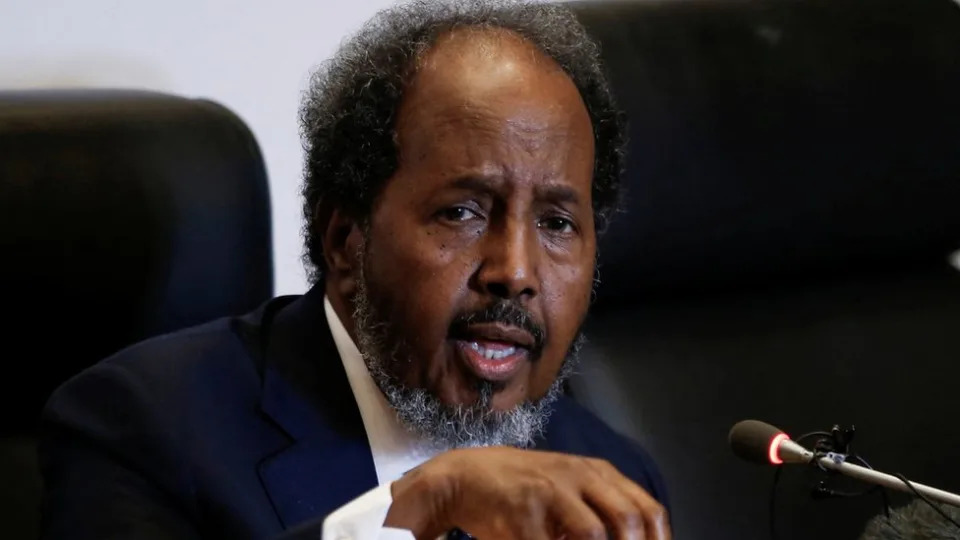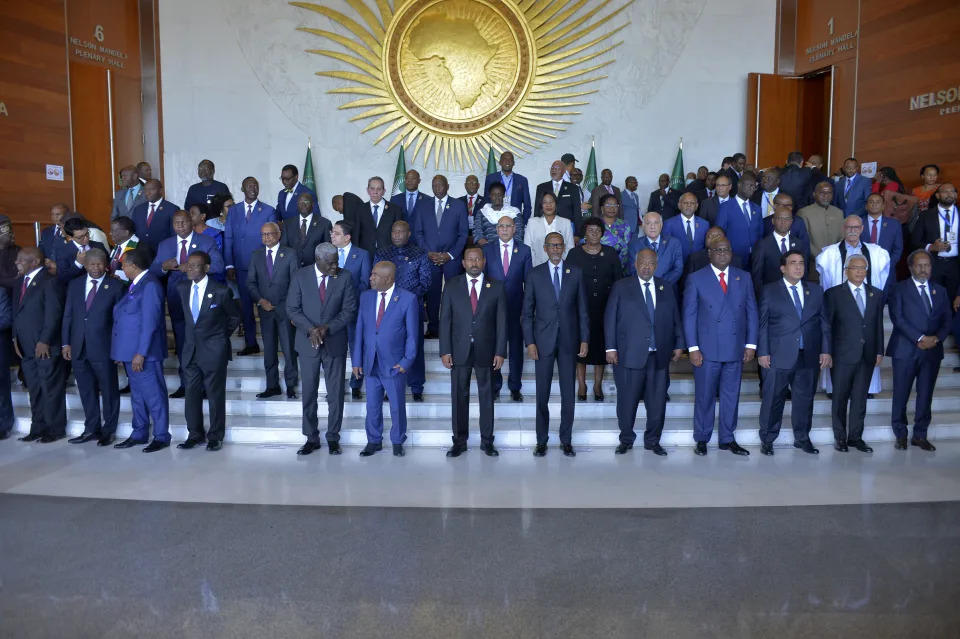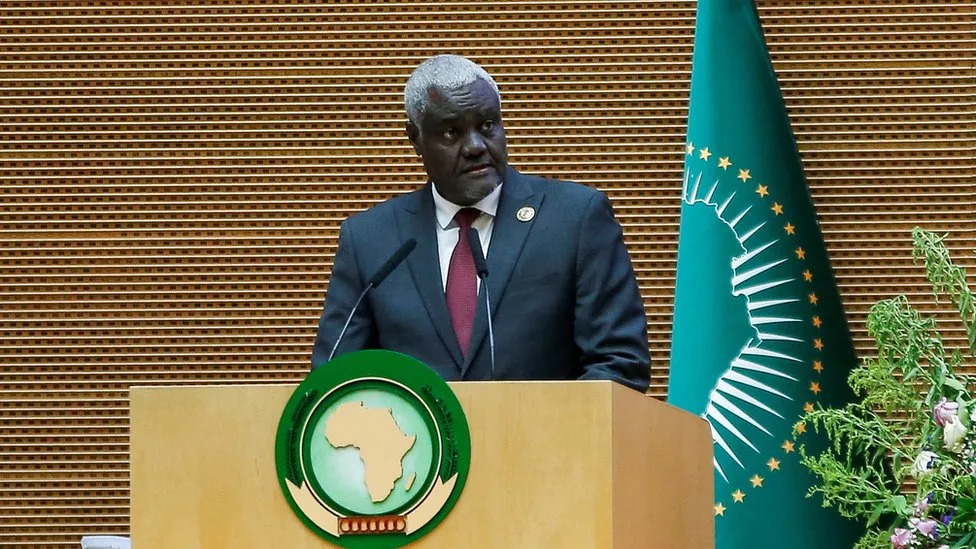Leaders at an African Union summit in the Ethiopian capital Addis Ababa on Saturday condemned Israel’s offensive in Gaza and called for its immediate end.
African heads of state, gather for a group photograph at the 37th Ordinary session of the Assembly of the African Union (AU) Summit at the AU headquarters in Addis Ababa, Ethiopia.
Moussa Faki, the chair of the African Union Commission, said Israel’s offensive was the “most flagrant” violation of international humanitarian law and accused Israel of having “exterminated” Gaza’s inhabitants.
Faki spoke alongside Palestinian Prime Minister Mohammad Shtayyeh, who also addressed the summit.
“Rest assured we strongly condemn these attacks that are unprecedented in the history of mankind,” Faki said to applause from delegates. “We want to reassure you of our solidarity with the people of Palestine.”
Azali Assoumani, president of the Comoros and the outgoing chairperson of the African Union, praised the case brought by South Africa against Israel at the International Court of Justice while condemning “the genocide Israel is committing in Palestine under our nose.”
“The international community cannot close its eyes to the atrocities that are committed, that have not only created chaos in Palestine but also have disastrous consequences in the rest of the world,” Assoumani said.
A quarter of Gaza’s residents are starving because of the war, which began with Hamas’ assault into Israel on Oct. 7, in which militants killed about 1,200 people, mostly civilians, and abducted around 250.
Israel strongly denies committing genocide in Gaza and says it does all it can to spare civilians and is only targeting Hamas militants. It says Hamas’ tactic of embedding in civilian areas makes it difficult to avoid civilian casualties.
During last year’s AU summit, an Israeli delegate was unceremoniously removed from the plenary hall amid a row over the country’s observer status at the continental body.
Concern over conflicts and the resurgence of coups across the African continent also underscored the opening of this year’s summit. Faki cited tensions over Senegal’s postponed election and violence in eastern Congo, Sudan, the Sahel, and Libya. He called for a revival of “the spirit of African solidarity and Pan-Africanism” to overcome the many challenges facing the continent of 1.3 billion people.
Ethiopia-Somalia tensions boil over at AU summit
Tensions between Horn of Africa rivals Ethiopia and Somalia boiled over on Saturday on the opening day of an African Union summit in Addis Ababa.
The two neighbours -- already at odds over a controversial maritime pact -- locked horns over Somalia's claims that Ethiopian security tried to block its President Hassan Sheikh Mohamud from accessing the summit venue.
The feud is one of a "litany of difficulties" referred to by AU Commission chief Moussa Faki Mahamat in his opening address to the gathering in the Ethiopian capital.
Faki painted a "bleak picture" and said leaders of the pan-African body had to step up and tackle the myriad conflicts, coups and political crises blighting the continent of 1.4 billion people.
The 55-nation AU, which is headquartered in Addis Ababa, has long been criticised for being ineffectual and taking little decisive action in the face of numerous conflicts and power grabs.
In a sign of the uneasy relations between two member states, Mogadishu accused Addis Ababa of "outrageous conduct" and a "provocative" act over the reported security incident and demanded a full AU investigation.
Mohamud told reporters he had been blocked by Ethiopian security agents as he tried to enter a summit venue, a second time while accompanying Djibouti's President Ismail Omar Guelleh.
"A soldier with a gun stood in front of us and denied us access to this facility," he said after later attending the summit.
Ethiopia insisted Mohamud was warmly welcomed and that the Somali delegation was blocked when its security detail tried to enter a venue with weapons.
- 'Worrying trends' -
Mogadishu has accused Addis Ababa of violating its sovereignty over a January maritime deal with Somaliland, which declared independence in 1991 in a move not recognised by the international community.
Under the memorandum of understanding, Somaliland agreed to lease 20 kilometres (12 miles) of its coast for 50 years to landlocked Ethiopia, which wants to set up a naval base and a commercial port on the coast.
Faki had earlier spoken of "worrying trends" in the Horn of Africa without directly referring to the maritime pact, but said respect for the sovereignty of all countries in the region was crucial.
The commission chief also blasted a failure of African leaders to counter multiple "unconstitutional changes of government".
Gabon and Niger are absent from the summit following their suspension over coups last year -- joining Mali, Guinea, Sudan and Burkina Faso, which are also barred for similar reasons.
Faki also voiced worries about the crisis in Senegal, set off by President Macky Sall's last-minute move to push back this month's elections in a country usually considered a beacon of democracy in West Africa.
But he said he hoped for a "spirit of consensus" to organise "inclusive, free and transparent elections as quickly as possible" after the Constitutional Council overruled Sall's move.
Elsewhere, Sudan was "bruised, torn, sinking into chaos," Faki said, while Libya was divided and exposed to external interference, the Sahel was facing a dangerous vacuum, and "terrorism" was diverting much-needed funds for social programmes to military spending.
The Great Lakes region of central Africa was, he said, witnessing a worsening of "eternal crises" fuelled by the conflict in the eastern Democratic Republic of Congo.
"Africa cannot remain arms folded and not work to promote genuine peace in the region," Faki added.
A mini summit looking at ways to relaunch the peace process for the DRC was held on Friday on the sidelines of the main AU meetings but no breakthrough was reported.
Angolan President Joao Lourenco, who initiated the gathering, met separately Saturday with DRC President Felix Tshisekedi and his Rwandan rival Paul Kagame, the Congolese presidency said on X, adding that Lourenco would continue mediation in Luanda.
- 'Challenges not diminished' -
Other issues faced by African nations include political instability, climate change, poverty, "deficits" in economic governance and marginalisation of women and young people in development and leadership, Faki said.
"Our main challenges have not diminished in importance."
Beyond Africa, the deadly Israel-Hamas conflict in Gaza was a hot topic on Saturday.
Palestinian prime minister Mohammad Shtayyeh, among the speakers, called for sanctions on Israel and urged African leaders to make their voice "loud and clear".
The bloc managed to avoid a crisis on another front by defusing tensions over the one-year rotating AU chairmanship, which was transferred Saturday from Comoros President Azali Assoumani to Mauritanian President Mohamed Ould Ghazouani.
The succession had long been blocked by an Algeria-Morocco dispute, underscoring internal divisions even as the AU seeks to have a stronger voice on the global stage, including in the G20 grouping which it joined in September.
AU Commission chief urges action on Africa instability
Chair of African Union Commission Moussa Faki Mahamat standing at a podium.
The chair of the African Union Commission (AUC) has called on leaders to tackle conflicts in the continent, and condemned a series of coups in some African countries.
Moussa Faki Mahamat made the call on the first day of the two-day AU summit.
War in Sudan and instability in the Democratic Republic of Congo are at the top of the African bloc's agenda.
The conflict between Israel and Hamas, poverty, climate change and education are other key topics to be discussed.
In his remarks to delegates at the summit in the Ethiopian capital Addis Ababa, Mr Faki - who heads the AU's secretariat which manages the day-to-day activities of the bloc - said he was extremely worried about a "litany of difficulties" facing the region.
He said Sudan was "bruised, torn, sinking into chaos" from a war that has been raging since 2023, Libya was divided and exposed to foreign interference, and the Sahel region was facing a dangerous power vacuum.
He expressed concern over the instability in the Democratic Republic of Congo, saying the conflict in the east of the country was leading to a worsening of its "eternal crises".
"Africa cannot remain arms folded and not work to promote genuine peace in the region," he said.
'Unconstitutional changes of government'
Mr Faki also criticised "unconstitutional changes of government" following a string of coups in West Africa, and expressed concern that terrorism was destabilising some countries in the continent.
He said the rise in terrorist insurgencies was resulting in "exorbitant military spending, at the expense of vital social sectors, while opening the way to misleading populist speeches."
His comment comes after three junta-led countries - Niger, Mali, and Burkina Faso - announced they would leave the Economic Community of West African States (Ecowas) after refusing calls to return to democratic rule.
Military leaders have argued that they want to restore security before organising elections as they struggle to contain jihadist insurgencies linked to al-Qaeda and Islamic State.
Mr Faki also voiced concerns about the political crisis in Senegal, after the country's President Macky Sall tried to postpone the election, due to be held this month, until December
On Thursday, Senegal's top court blocked Mr Sall's attempt to delay the polls, with the president vowing to hold elections "as soon as possible".
Commenting on developments in the country, Mr Faki said: "The situation in Senegal, a model country in terms of democracy, worries us to a great degree."
However, the AUC chair welcomed the Senegalese government's decision to follow the Constitutional Council's ruling, and said he hoped "free and transparent" elections would be held there soon.
Ecowas is also expected to hold a meeting on the sidelines about Senegal's decision to postpone presidential polls.

Mr Faki's remarks were overshadowed by Somalia's president accusing Ethiopian security forces of trying to prevent him from entering the summit venue in Addis Ababa.
Hassan Sheikh Mohamud told reporters that security staff first tried to stop him from leaving his hotel and later blocked his access to the venue where he arrived with Djibouti's president.
The fracas comes as Somalia accuses Ethiopia of trying to annex part of its territory by signing a deal with the breakaway region of Somaliland, giving it access to the sea.
Kagame to Attend Meeting Called by Angola on Congo Conflict
Rwandan President Paul Kagame will attend a meeting of heads of state on Friday called by Angola to discuss the escalating conflict in eastern Democratic Republic of Congo.
The meeting will take place on the sidelines of the African Union summit in Addis Ababa, his spokeswoman Yolande Makolo said.
The meeting comes in the same week that South Africa announced that it’s sending 2,900 troops to fight rebels in the region as part of a Southern African Development Community deployment. That will potentially put it on the other side of the conflict from Rwanda, which the United Nations has accused of backing the M23 rebel group. Kagame has denied the allegation.
'Bleak picture': AU leaders urged to tackle litany of crises
African leaders were urged Saturday to step up and tackle the myriad conflicts and political crises blighting the continent of 1.4 billion people.
Opening the African Union's two-day summit, AU Commission chief Moussa Faki Mahamat painted a "bleak picture" with a "litany of difficulties" confronting many countries.
Faki blasted a failure to counter multiple "unconstitutional changes of government", following a string of coups in West Africa and warned the scourge of "terrorism" was diverting money away from vital social needs to military spending.
Sudan was "bruised, torn, sinking into chaos," Faki said, while Libya was divided and exposed to external interference, and the Sahel was facing a dangerous vacuum.
The Great Lakes region of central Africa was, he said, witnessing a worsening of its "eternal crises" fuelled by the conflict in the eastern Democratic Republic of Congo.
"Africa cannot remain arms folded and not work to promote genuine peace in the region," Faki added.
A mini-summit looking at ways to relaunch the peace process for the DRC -- attended by Congolese leader and his Rwandan rival -- opened Friday on the sidelines of the main AU meetings and was due to continue on Saturday.
Gabon and Niger were absent from the summit following their suspension over coups last year -- joining Mali, Guinea, Sudan and Burkina Faso, which are also barred for similar reasons.
But the 55-member bloc has long been criticised for being ineffectual and taking little decisive action in the face of numerous conflicts and power grabs.
- 'Challenges not diminished' -
Faki voiced worries about the crisis in Senegal, set off by President Macky Sall's last-minute move to push back this month's elections in a country usually considered a beacon of democracy in West Africa.
But he said he hoped for a "spirit of consensus" to organise "inclusive, free and transparent elections as quickly as possible" after the Constitutional Council overruled Sall's move.
Faki also spoke of "worrying trends" in the Horn of Africa, where tensions are high after AU host nation Ethiopia infuriated Somalia with a deal with the breakaway region of Somaliland to give it long sought-after access to the sea.
"Our main challenges have not diminished in importance," Faki said, pointing also to political instability, climate change, poverty, "deficits" in economic governance and marginalisation of women and young people in development and leadership.
Ahead of the summit, Nina Wilen, director of the Africa programme at the Egmont Royal Institute for International Relations think tank in Brussels, said she did not expect any strong decisions by the AU.
The body has so far had "very little influence on countries that have suffered recent coups", she said, adding that member states did not want to set precedents that could clash with their own interests.
Beyond Africa, the Israel-Hamas conflict in Gaza was a hot topic, with Palestinian prime minister Mohammad Shtayyeh among those attending from outside the region.
- 'States looking inward' -
The bloc managed to avoid a crisis on another front by defusing tensions over the one-year rotating AU chairmanship, which was transferred Saturday from Comoros President Azali Assoumani to Mauritanian President Mohamed Ould Ghazouani.
The succession had long been blocked by a dispute between Morocco and Algeria, highlighting internal divisions within the AU even as it seeks to have a stronger voice on the global stage, including in the G20 grouping which it joined in September.
Portending more challenges, 19 presidential or general elections are scheduled on the continent this year.
"The AU has ambitious institutional commitments and tools for mediation and peacekeeping but lacks the political and financial strength to make the most of them," the International Crisis Group said in a briefing note.
"Member states are looking inward, closely protecting their sovereign prerogatives rather than investing in collective security."
Another major subject of discussion at the summit is expected to be how the AU will transition to relying on African states to fund most of its budget rather than foreign donors.
The UN Security Council in December adopted a resolution to finance AU-led peace missions, but capped it at 75 percent of the budget.





